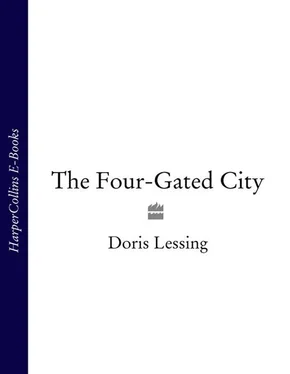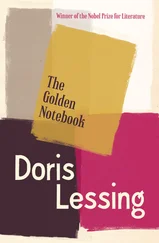‘You won’t come and live here, Martha?’
‘No. I can’t, Jack.’
‘I knew you wouldn’t. I suppose that’s why I was afraid to bring it up – I didn’t want to hear you say no.’ ‘Somebody else will, I expect.’
‘Yes. But I would have liked it if you could have trusted me.’ He was nearly crying again.
‘Have you ever thought – we make decisions all the time: but how? It’s always in reference to – we make them in obedience to something we don’t know anything about?’
‘No. I make decisions!’
‘Ah, you’re master of your fate.’
But one did not tease Jack, he could not be teased.
‘Don’t laugh at me, Martha!’
‘I’m not. But looking back, we think we’ve made decisions – it’s something else that makes them.’
‘Ah, Martha,’ he said suddenly, rough: ‘You’re not coming back to me, you aren’t going to stay with me!’
‘I didn’t say that.’
‘No? I don’t know why, but that’s what I thought you were saying.’ ‘No.’
‘You’ve got to believe I want you to. I know what you’re thinking – you’re a woman! He’s got so many girls, he doesn’t care. But it’s not true. I’m not promiscuous, I don’t like changing and having new girls. I want girls who’ll always come back, the same girls. I’m very faithful, Martha, you’ve got to believe me.’
Soon he fell asleep. She was not sleepy. She lay holding his body, the long thin cage of bones, over which such a light shelter of flesh lay breathing. She felt how he was alert, ready to wake at a sound or a touch, even though he seemed to be deeply asleep. She would have got up and dressed and gone, if she could have done it without waking him. But she knew he would start up if she so much as slid her arm away from beneath his head. Her hand lay on his back, feeling the bones branch off from the central column of bone. Past his shoulder she looked into the recess where the window was that had to be kept shuttered because of the odours from the canal. Beneath that window, a scene of littered back garden, unkept hedges, rubbish bins, a slope of dirty soil to a low weed-grown canal. On a hot afternoon during the vanished heatwave, she had sat in the window watching children brown from six weeks of that sun, dive and swim like water-rats among the weeds. From time to time a woman shrieked from a window: Tommy! Annie! Where are you? You’re not to swim in that water! The children cowered in the water, looking up at the windows. The women knew that the children were in the water, and that there was no way of stopping them: they had swum there themselves when they were sleek brown rats among water-weeds.
The candle on the floor near this window sunk, shook wildly and went out. The man in Martha’s arms slept, his face, a boy’s face, tear-marked, a few inches from hers. The candles on the mantelpiece burned for a while longer. Then the room was a pit of dark. Then Martha herself dropped into the pit. She dreamed. That picture, or vision, she had seen behind her eyes of the house with the sad children, came again but now it was not a sharp image, a ‘still’, or a series of ‘stills’; but a long moving dream. A large London house – but not this one. There was traffic outside it, but also the presence of trees. Full of people. Children. Half-grown children. Sad. It was a sad, sad dream. But not a nightmare: no fear came with it. Martha was in the dream, she was responsible for the children. She was worried, anxious: but she held the fort, she manned defences.
They woke very early, having slept so early. It was just light – about five. Jack cooked them breakfast on his spirit stove. Then she kissed him and left. The door off the hall was still open, and in the low grey light, the mad youth lay asleep on the floor beside the candle that had burned itself out. Outside, a young morning, with a low wet sun. With luck, it would be a fine day. Martha set off towards Iris and Jimmy across the river, locked inside Mrs Van’s coat.
She rode high in a red bus over streets tinted by damp sunlight, crossed a strongly ebbing river with gulls at eye-level – flashing white wings, seen through dull glass; and descended to earth or street-level as Big Ben said it was seven. But it would not do to reach Joe’s café before eight. That household had two starts to its day, one at about five, when Iris, Jimmy still asleep, rose to feed cornflakes, toast, scrambled powdered egg and tea to some young lorry drivers from a lodging house down the street whose landlady would not feed them so early; another at nine, when the side of the card that said OPEN was turned in invitation to the pavement. With the apprentice lorry drivers were a couple of older men, among them Iris’s cousin Stanley, whom she had fancied for Martha; and some charwomen, their early office-cleaning over, who dropped in for a cup of tea before going home to feed breakfast to their families. Between five and eight that café was a scene of bustling, steaming animation, of intimacy. If Martha were to go in now, unexpected, after two unexplained nights, she could only do so as ‘Matty’. And she was damned if she would. If Iget taken over by her, then I’ll have her riding me for the rest of the day, and I won’t have her around when I’m lunching with Phoebe.
Early sun flashed on a thousand windows and on the gulls’ wings. The great buildings on either side of the river stood waiting, empty; not empty: for at this hour an army of women were at work with their vacuum cleaners, making them hum and vibrate like beehives. They stopped to gossip along corridors where soon, but not for two hours yet, men still fighting for another few minutes’ sleep in surburban bedrooms ten, fifteen, twenty miles away, would come hurrying in, Good morning, good morning, good morning, diverging into rooms where the waste-paper baskets had been emptied. In they’d flow, to be flung out again by the sound of Big Ben striking five, as thousands of telephones went silent, all at once. Martha dawdled, lost her way in a mesh of little streets, and hit the street of the café a hundred yards down from the bombed site. Turning right, she greeted the slab or hulk of timber. In the less than two days since she had seen it, a minute yellow flower had emerged from a crevice. That great salty, sour, more-stone-than-wood monument had put out a coronet of green leaves and a flower. A small wind tugged at it, but the flower held firm, its roots being well dug in. Martha peered through a wire door that had the death’s head and No Children on it, and saw the lock was loose in its socket. She pushed and went in. Deserted: too early for the children. But no, a small girl wearing an ancient black jersey over a white dress that looked as if it had been starched for a party sat on a brick in the dust. She kept still. ‘Good morning,’ said Martha cheerfully and the child’s eyes concentrated in terror. Then she fled, jumping like a cat over a far wall into safety away from the woman in the black coat. If this were a ruined city, a poisoned city, what would the excavators a hundred years later deduce from what they saw here? Facing Martha, the surface of a jagged wall, three stories of it, rose up sharp from the low edges of rubble. There were three fireplaces, one above another. Each level of wall was tinted a different colour, as if by moss or lichen: wallpaper soaked and dried, soaked and dried, again and again. Pale green. Above that, pinkish shaggy brown. Above that dim yellow. Coming closer, it could be seen, where a long strip had been torn away off the green, that beneath was a darker green. Martha got up on to an edge of wall, and slid her fingernails under the edge of paper. A thick sog of paper: layers of it, now stuck together. Once each had been a loving and loved skin for the walls, which held the lives of people. But they were fused together, like a kind of felt. Martha pulled. A lump came away. Picking at the layers, she counted thirteen. Thirteen times had a man stood on trestles, or perhaps a table (these were small cheaply built houses, with low ceilings, and probably the kitchen table would have been high enough) and stretched new clean paper over the stains and dirts of the layer beneath. Thirteen times had a wife, or children said: Yes, that’s very nice, I like that, dad; or had said No, we chose wrong. The two papers at the very bottom were rather beautiful, judging from the inch or so she had to look at: they got progressively uglier as the decades slid by. The one at the top was hideous, must have been an acid green, with a bad jangling pattern. In the middle was a rather pretty sprigged pattern, like a Victorian young lady’s morning dress … voices from the street. Precisely as the little girl had done, Martha froze: authority! She ought not to be here. She sneaked down off the wall, pushing the wadge of coagulated paper into Mrs Van’s pocket; and hid behind a heap of bricks until it seemed safe to go out into the street.
Читать дальше












